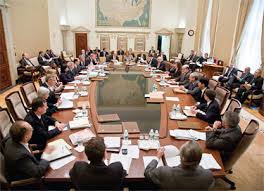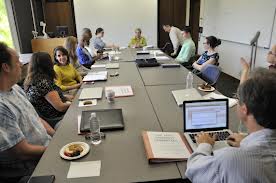Board Work via Board Committees
By Dani Robbins
Re-published with permission from nonprofit evolution blog
 Appointed or elected community leaders govern an organization. As outlined in my favorite Board book Governance as Leadership and summarized in The Role of the Board, the Fiduciary Mode is where governance begins for all boards and ends for too many. I encourage you to also explore the Strategic and Generative Modes of Governance, which will greatly improve your board’s engagement, and also their enjoyment.
Appointed or elected community leaders govern an organization. As outlined in my favorite Board book Governance as Leadership and summarized in The Role of the Board, the Fiduciary Mode is where governance begins for all boards and ends for too many. I encourage you to also explore the Strategic and Generative Modes of Governance, which will greatly improve your board’s engagement, and also their enjoyment.
At a minimum, governance includes:
- Setting the Mission, Vision and Strategic Plan
- Hiring, Supporting and Evaluating the Executive Director
- Acting as the Fiduciary Responsible Agent
- Raising Money and
- Setting Policy
Committees are how the work of the board gets done. The committees, their structure and definitions will be outlined in your organization’s by-laws, which in Ohio are called Code of Regulations.
The by-laws will also dictate if committee chairs and committee members must be board members. I recommend that the chairs be board members but that committee membership not be limited to only board members. Committee work is a great way to build the bench of a board, see how someone works and it they are a good fit for a future board position. Most organizations have a requirement that Board members serve on at least one committee.
Committee members are responsible to the full Board for the research, work, framing of the issues and recommendation in their assigned area. There are a minimum of three committees I recommend as “must haves,” which are Board Development, Resource Development, and Finance Committee.
There is often also some version of an Executive Committee and there may be other committees as well. Let’s review each.
Executive Committee
The Executive Committee is usually the four Officers (President, Vice-President, Treasurer and Secretary of the Board) or the Officers plus the Committee Chairs. Less often, Executive Committees have members at large.
Executive Committees can sometimes make decisions in lieu of the full board. This will be clearly stated in the by-laws. I generally recommend against this. In fact, other that in emergency situations when I think they’re critical, I generally recommend against the Executive Committee meeting on a regular basis.
Powerful Executive Committees tend to disengage the remaining board members. It allows the few to operate without the whole. Anything that contributes to board member disengagement works against the agency’s success and should be avoided.
Finance Committee
 The Finance Committee, chaired by Treasurer, works with the appropriate staff in examining the financial reports, understanding and monitoring the financial condition of the organization and preparing the annual budget. The Treasurer presents the monthly financial statements to the Board at each board meeting. This committee also selects an audit firm each year and reviews the audit plan, audit and 990, which should be signed by the Treasurer prior to submission.
The Finance Committee, chaired by Treasurer, works with the appropriate staff in examining the financial reports, understanding and monitoring the financial condition of the organization and preparing the annual budget. The Treasurer presents the monthly financial statements to the Board at each board meeting. This committee also selects an audit firm each year and reviews the audit plan, audit and 990, which should be signed by the Treasurer prior to submission.
As it is sometimes considered a conflict that the committee that monitors the books also manages the auditor selection, it is considered a best practice to have a separate audit committee. If this is not feasible for your organization and as auditing firms are independent of the agency, this conflict can be mitigated by bidding out your audit and changing your auditor every few years.
Resource Development Committee
The Resource Development Committee works with the CEO, the senior development staff, if there is one, and the Board of Directors in developing strategies to identify and secure needed resources and funding to support the operations of the organization. The Committee is responsible for creating and executing a plan to raise money. The full Board is responsible for introducing their network to the organization, attending events, financially supporting the organization and encouraging other to do as well.
Board Development Committee
The Board Development Committee is concerned with identification of new Board members and the development of the future leadership of the Board. The Board Development Committee helps develop an effective Board through its two main functions:
Board Building: A diverse board of directors (thought, skill, race, faith, ability, orientation, age, and gender) that is passionate about the mission of the organization is created through a Board Building process.
Board Education: Board members will fully understand and effectively fulfill their commitments to the Board of Directors when a comprehensive orientation, continuing education, annual evaluation and recognition process is in place.
With the exception of a functioning Executive Committee, the Board Development Committee is usually the most powerful committee of the Board. It is often the only committee that you can’t just volunteer for but must be invited to join.
Other Committees
Some Boards also have program committee, human resource committees and a variety of other committees.
The Program Committee is responsible for the program side of the Board’s fiduciary responsibility. They focus on how the programs tie to the organization’s mission, what they impact, how that impact is measured and the number of people who are served in those programs.
The Human Resource Committee is responsible for the development and recommendation of the personnel and other relevant policies, the creation of a salary adjustment plan and the framework for the CEOs evaluation.
A Word of Caution
 I recommend caution when creating committees to do the work of staff. It gets very confusing as to who is responsible for what and responsible to whom. If Board members are acting in staff roles, the Executive Director retains the authority for decision-making. If the Board members are operating within the scope of their roles, the Board has the authority for decision-making. Conversations had in advance can help you avoid role confusion and the overstepping of boundaries.
I recommend caution when creating committees to do the work of staff. It gets very confusing as to who is responsible for what and responsible to whom. If Board members are acting in staff roles, the Executive Director retains the authority for decision-making. If the Board members are operating within the scope of their roles, the Board has the authority for decision-making. Conversations had in advance can help you avoid role confusion and the overstepping of boundaries.
Do you agree with my three “must have” committees? What else do you recommend? What is your experience with committee work? As always, I welcome your insight, feedback and experience.

